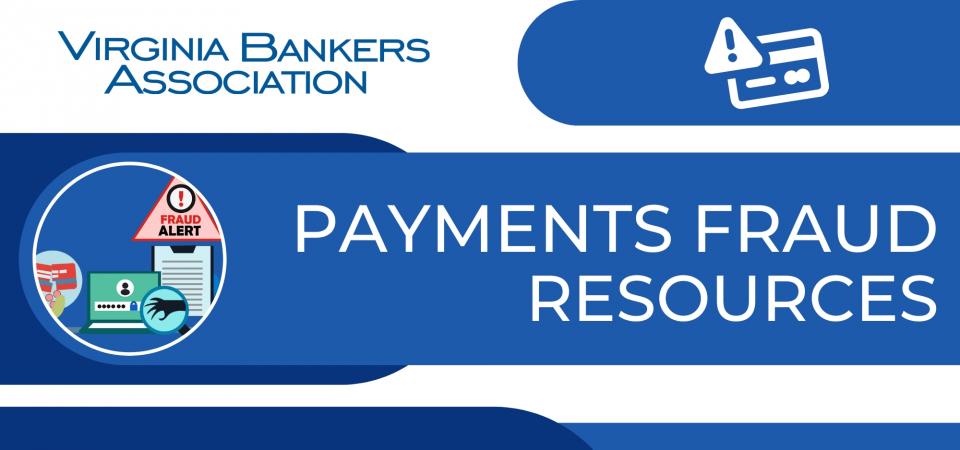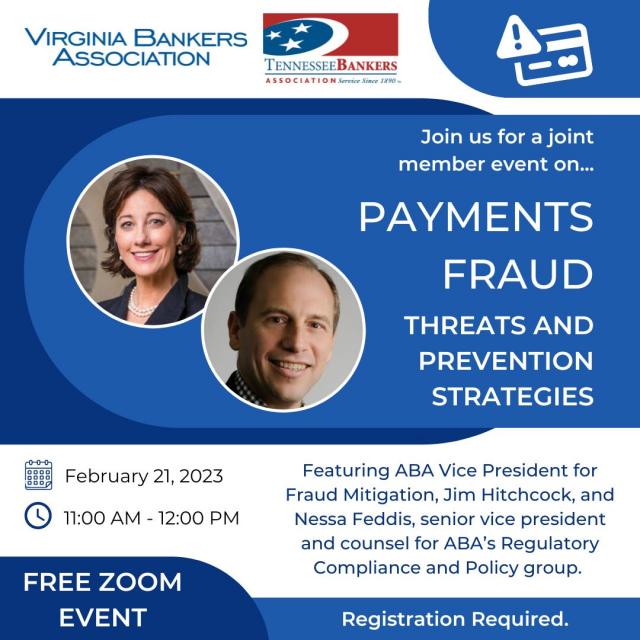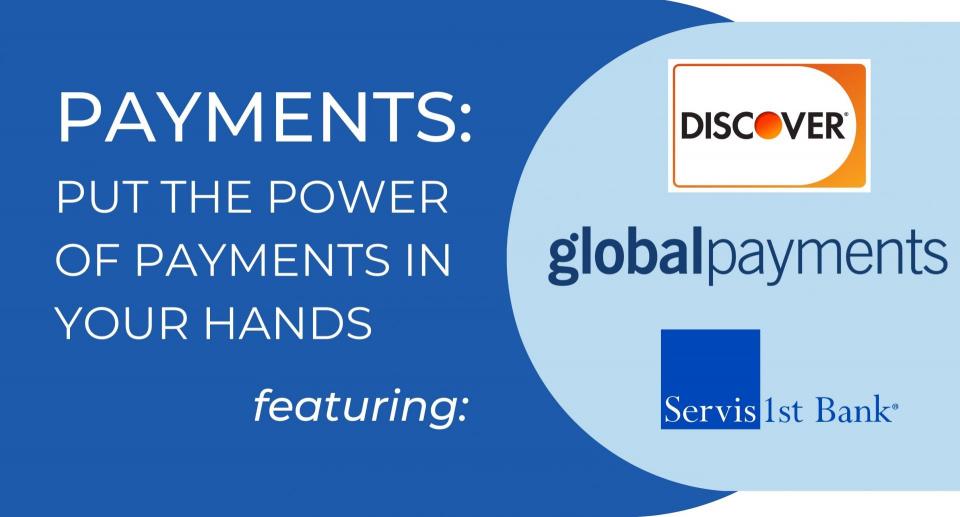Payments Fraud Resources
In recent years, fraud and theft have exploded in older types of payments, like bank wire transfers and Electronic Benefits Transfer (EBT) cards, as well as new payment types like person-to-person payments (Zelle, Paypal, Venmo, etc.). These instant P2P payments are an increasingly popular platform for scammers seeking to take advantage of consumers, yet check fraud remains a focus of bank risk professionals. On this page, VBA members will find payments fraud resources.
Education & Training
New in 2025! Prevent, Protect, Prevail: A Banker’s Guide to Check Fraud
With advancements in technology, fraudsters are finding new ways to exploit vulnerabilities in check processing. During this two-part virtual series, seasoned Fintech executive John Ravita, will explore the factors contributing to the resurgence of check fraud, how institutions can strengthen their defenses and provide tools for banks to equip both their customers and their teams to recognize check fraud.
- When: January 31 and February 7 from 9:30-11:00 am
- Cost: $85 per person (each registrant will receive a unique Zoom log-in)
- Learn more and register here!
-
Elder Financial Exploitation Prevention Training
The VBA partnered with representatives from the US Attorney’s Office, Adult Protective Services, law enforcement, and the American Bankers Association for the Elder Financial Exploitation Prevention Seminar in September 2024. Topics Included:
- Elder Financial Exploitation – Types and Current Trends
- Suspicious Activity Reports
- Recognizing Indicators of Elder Financial Exploitation & Working with Your Local Agency
- Federal Law Enforcement’s Role in Preventing Elder Financial Exploitation – When & How to Engage with Them
- Virginia Safe Senior Act Overview
- Safe Banking for Seniors
The VBA plans to hold additional seminars like this in the future – please contact Kristen Reid to learn more.
Check Fraud webinars from OnCourse/BankWebinars.com
View different webinar options from OnCourse/BankWebinars.com here.
Fraud Recognition and Prevention self-paced ABA training
This self-paced course describes check fraud, check kiting and other check scams. It also discusses how bank products, services, and information security can be vulnerable to identity theft activity and explains types of credit fraud such as application fraud, personal loan information fraud, mortgage lending fraud, and lines of credit fraud. Learn more here.
ABA Check Fraud Training
Click here to view all of the check fraud training available from the ABA.
Payments Fraud: Threats and Prevention Strategies Virtual Event
The VBA and the Tennessee Bankers Association held this joint event on February 21, 2023, which featured ABA Vice President for Fraud Mitigation, Jim Hitchcock, who serves as the Association’s primary expert on fraud mitigation activities and programs. Nessa Feddis, senior vice president and counsel for ABA’s Regulatory Compliance and Policy group, also presented during the event.
- Learn more about Jim Hitchcock and Nessa Feddis here.
- View the slides from Jim and Nessa's presentation here.
ABA Resources
ABA Fraud Contact Directory
In 2023, ABA launched a Check Fraud Claims Directory to address a crucial pain point in the fight against check fraud: the amount of time it takes for a bank to process a check fraud warranty breach claim with another institution. Their goal was to provide a one-stop destination for banks to access the information needed to file these claims with another bank and achieve quicker resolutions for their customers. ABA has expanded the directory to include contact information for unauthorized or fraudulent transfers for wires, ACH, RTP or FedNow in addition to check warranty breach claims. Learn more here.
ABA Small Bank Check Fraud Working Group
ABA has formed a working group for banks with assets under $50 billion to explore ways to enhance customer service, communication and timeframes related to deposit account check claims. Bank staff involved in the strategic, operational, compliance and/or risk functions of check fraud are encouraged to join the group. Meetings will occur every other month, with the first meeting planned for February 2025. Read more.
ABA Fraudcast
Hosted by cybersecurity and anti-fraud leader Paul Benda, the ABA Fraudcast bi-weekly podcast brings you expert insights, tools and strategies to help fight fraud. Listen here.
#Banksneveraskthat and #practicesafechecks campaigns
ABA’s award-winning anti-phishing campaign #BanksNeverAskThat has more than 1,300 banks participating across the country. The ABA has added a new check fraud campaign, #PracticeSafeChecks, that includes a website, social media posts and videos — to educate your customers about using checks safely and paying digitally whenever possible.
The campaign also features new #BanksNeverAskThat anti-phishing materials, including videos and social media posts, to help you protect your customers from phishing scams. The website and all the toolkit assets for both campaigns are available in English and Spanish.
View the consumer pages below:
Register your bank’s FREE participation here. You do not have to be an ABA member to participate in these important campaigns.
ABA Check Fraud Resources
On this page, you’ll find resources to help banks prevent, identify, measure and report check fraud, and to serve and protect consumers and their financial data.
Other ABA Resources
- Check Fraud Detection and Mitigation Product Assessment - Explores how banks are tackling this growing challenge, highlighting key developments and profiling leading technology providers offering innovative check fraud prevention solutions.
- ABA Check Fraud Toolkit
- Infographic: Crypto Investment Scams
- Suspicious Activity Reports: An Essential Tool in Combating Elder Financial Exploitation
- Tackling Check Fraud Challenges Presentation - This presentation covers which regulations apply to particular types of check fraud and who is liable.
-
Check Fraud and ACH Loss Reporting Working
Group - This reporting group tracks quarterly
check-related losses from forgeries, counterfeits, alterations,
kiting, and seven return reasons. Also reported are new account
losses, identity fraud losses, organized customer scams, losses
by deposit channel, and ACH losses. Losses are scaled by the
number of transaction accounts.
- Contact James Hitchcock, ABA, at jhitchcock@aba.com to learn more and sign up for the group.
- To view a full list of other ABA working groups, including others focused on different types of fraud, click here.
- ABA Check Fraud Data Survey
- Download a Fake Check Scams Infographic Here.
- Article: Combating Check Fraud: Still A Major Challenge in the Digital Age: ABA Risk and Compliance
- Podcast: Something Old, Something New in Payments Fraud: ABA Banking Journal Podcast
- Article: Check Theft & Check Washing
- CNBC Interview: Banks Can’t Fight Check Fraud Alone (with ABA’s Paul Benda)
- Article: Is It Time to Kill the Paper Check?
- Article: ABA, associations: Fighting fraud is a multi-industry, government effort
- FinCEN: Financial institutions reported $27 billion in elder financial exploitation
- Article: ABA, U.S. Postal Inspection Service launch effort to combat check fraud
- Survey: Consumers value fraud protection when seeking financial services
- Article: Fighting bank scammers requires a collaborative effort
- Article: White paper identifies deepfake fraud types and controls
Consumer Tips: Prevent Fake Check Scams
Below, you’ll find a set of check fraud consumer tips from the ABA:
-
Bank systems prevent the majority of check fraud attempts.
- Banks’ prevention systems stopped about 89 percent or $22 billion in fraud attempts in 2018, according to ABA’s Deposit Account Fraud Survey Report (2019).
- Attempted check fraud at U.S. banks totaled $15 billion in 2018. Actual bank losses totaled $1.3 billion in the same year, up from $789 million in 2016.
- Banks use a wide range of approaches to counter-check fraud including deposit review, fraud detection tools, hold policy, teller/branch controls, and customer education.
- Even if the check has “cleared,” you may not be in
the clear.
- Under federal law, banks must make money from deposited checks available quickly – usually within two days. But just because you can withdraw the money doesn’t mean the check is good, even if it’s a cashier’s check or money order. Forgeries and fakes can take weeks to be discovered.
- Consumers and businesses are responsible for the checks they deposit because they know best the origin of the check. It can take weeks for a check to be returned as fraudulent. If you withdraw money and the check is returned, you are responsible for paying back the bank.
- If you are uncertain that a check is good, talk to your banker before withdrawing the money.
-
Beware of fake check scams.
- Scams that rely on getting people to deposit a fake check, withdraw the money, and then send the money to the fraudster – by wire, gift card, or money order, continue to grow.
- Here’s an example of how it works: A fraudulent buyer offers to send a cashier’s check or money order for an amount much larger than the value of the item and asks the seller to wire back the difference. The seller deposits the check, withdraws cash as soon as the funds are available, and then wires the leftover sum to the fraudulent buyer. Days later, the bank learns that the cashier’s check was fraudulent. Unfortunately, by then the seller has lost his or her money and merchandise to a scam.
- There are many variations of check fraud schemes including romance scams, work-from-home scams, fake lotteries, and more. Many ask the victim to wire the money, but some ask for gift cards or money orders.
- No legitimate company will offer to pay by arranging to send a check and asking the seller to send some of the money back, whether by wire, gift card, or money order. If that’s the pitch, it’s a scam.
Consumer Tips to Prevent Fraud:
- Don’t share your secrets. Don’t provide your Social Security number or bank account information to anyone who contacts you online or over the phone. Protect your PINs and passwords and do not share them with anyone. Use a combination of letters and numbers for your passwords and change them periodically. Do not reveal sensitive or personal information on social networking sites.
- Watch out for phishing emails. Sometimes fraudsters send very legitimate-looking emails that appear to come from a financial institution, e-commerce site, government agency or any other service or business. Often, the email urges you to act quickly because your account has been compromised in some way. If you are unsure whether an email request is legitimate, don’t reply, and don’t click on links or call phone numbers provided in the message.
- Use online banking to protect yourself. Monitor your financial accounts regularly for fraudulent transactions. Sign up for text or email alerts from your bank for certain types of transactions, such as online purchases or transactions of more than $500.
- Shred sensitive papers. Shred receipts, banks statements and unused credit card offers before throwing them away.
- Keep an eye out for missing mail. Fraudsters look for monthly bank or credit card statements or other mail containing your financial information. Consider enrolling in online banking to reduce the likelihood of paper statements being stolen. Also, don’t mail bills from your own mailbox with the flag up.
- Monitor your credit report. Order a free copy of your credit report every four months from one of the three credit reporting agencies at annualcreditreport.com.
- Report any suspected fraud to your bank immediately. Bank staff are experts in spotting fraudulent checks. If you think someone is trying to pull a fake check scam, don’t deposit it—report it. Contact your bank and report it to the Federal Trade Commission or The Better Business Bureau’s Scam Tracker.
Regulator/Governmental Resources
- Federal Reserve Bank Take on Payments Blog - this blog is intended to foster dialogue on emerging risks in retail payment systems and enhance collaborative efforts to improve risk detection and mitigation
- Your Complete Guide to Check Fraud: How to Identify Different Types of Check Fraud Before it Harms Your Bank – a recommended resource from the Federal Reserve Bank of Atlanta
- US Postal Inspection Service Resources – includes publications and handouts on a range of topics including scam and fraud prevention
- FBI – The FBI’s Internet Crime Complaint Center has brochures on fraud prevention and additional resources for victims of scams and fraud
- Consumer Financial Protection Bureau – their Money Smart for Older Adults has a number of resources for consumers and caregivers
-
Consumer Tips from the FDIC: What to Do If You Are
Scammed
- Check scams can be reported to the following agencies:
- The U.S. Postal Inspection Service www.uspis.gov (if you
received the check in the mail).
- The U.S. Postal Inspection Service has a fraud complaint webpage on its website. You may fill out and submit the Mail Fraud Complaint Form online. You may also call the U.S. Postal Inspection Service hotline at 1-800-372-8347 to file a complaint about suspected mail fraud. See related information on Mail Theft, Credit Card Fraud, and Identity Theft.
- Your state or local consumer protection agencies.
- For possible online crimes involving counterfeit checks and money orders, file an online complaint with the Internet Crime Complaint Center (www.ic3.gov) (a joint project of the FBI and National White Collar Crime Center).
- In addition to notifying the bank whose name is on the check, you can notify the website or online service where you encountered the scammer (for example, the online auction website or job posting website), so they can block them from utilizing their services in the future.
- The U.S. Postal Inspection Service www.uspis.gov (if you
received the check in the mail).
- Check scams can be reported to the following agencies:
- Federal Reserve expands check fraud detection tool to include commercial checks
-
OCC Resources
- New Fraud Resource Page: Visit the new consumer fraud awareness and prevention webpage on OCC.gov for information on the most common types of consumer fraud. Each type of fraud has a fact sheet outlining how it operates, warning signs, fraudulent tactics, and prevention and reporting steps. Download and share these resources to educate and safeguard others.
- BankWise–Your Rights Simplified: Check out this series of informational fact sheets on OCC.gov that help consumers understand the federal consumer protection laws and regulations applicable to national banks and federal savings associations. These fact sheets provide an overview of these laws and regulations, their key protections and requirements, and how to get assistance or file a complaint. OCC employees are encouraged to utilize these new resources in discussions with banks and community groups.
FINCEN
Information on Filing a Suspicious Activity Report (SAR):
- SAR Filing Uncovers Additional Counterfeit Check Fraud - Article from the Financial Crimes Enforcement Network (FINCEN)
- Connecting the Dots – The Importance of Timely and Effective SARs - Article from the FDIC
Virginia Law & Resources
- The Virginia Attorney General’s Office Consumer Protection Section investigates and creates awareness of fraud. This division also investigates and responds to consumer complaints on matters such as bad checks, bank fraud, mortgage fraud, and phone scams. They have a hotline for Virginia residents to report such cases.
- As a violation of Virginia’s laws on fraud, check fraud may involve making, passing, or possessing an altered/fake check with the intent to defraud an entity or a person. Most check fraud offenses are committed with the goal of gaining monetary gain. Check fraud can be committed through means such as forging checks and issuing bad checks. Check forgery involves using someone else’s legitimate checks (that have been stolen) or altering a check by adding digits or words to increase the amount. Virginia Code 18.2-172 considers forging as a crime that involves obtaining someone else’s signature with the intent to defraud the person.
- Virginia UCC and liability of parties
VBA Solutions
vba endorsed provider payments vendor virtual showcase
- You can view the recording of the March 1, 2023 virtual payments vendor showcase here.
- Download each of the companies’ presentations from the
showcase below:
- Discover Debit
- Learn more about Discover Debit here.
- Global Payments
- Learn more about Global Payments here.
- ServisFirst
- Learn more about ServisFirst here.
- Discover Debit
other vba solutions
- Thumbprint Signature: The Thumbprint Signature Program was created to provide a simple, effective and inexpensive method for preventing and deterring check fraud. The natural deterrent aspect of the program is its strongest advantage.
- FraudFighter Counterfeit Detection and Identity Authentication: With over 20 years of experience in the anti-fraud marketplace, UVeritech’s FraudFighter line of ID document hardware scanners, money counters, and anti-fraud software are accurate, easy to use, and protects against fraud risks and losses.
Additional Resources & Solutions
- US Treasury: Treasury Announces Enhanced Fraud Detection Processes, Including Machine Learning AI, Prevented and Recovered Over $4 Billion in Fiscal Year 2024
- Article: Customer Satisfaction with Digital Wallets Continues to Grow as Usage Skyrockets
- Article: Trending crimes: “Check washing” and “mailbox fishing” – Axios
- Report: State of Fraud Benchmark Report - Alloy
- Visa Dispute Rule Updates: Evolution of Compelling Evidence
- Article: BID Daily Newsletter: “Keeping Check Fraud in Check” – PCBB




